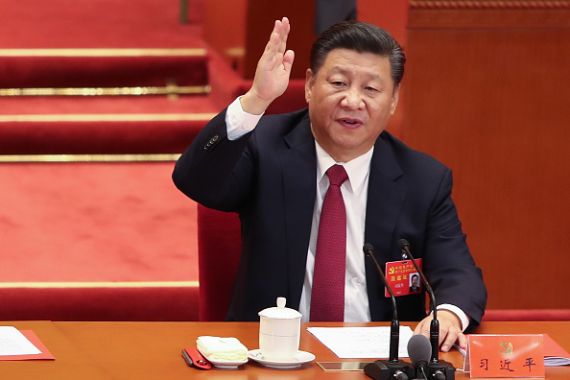China open to talks on subsidies behind US tensions, Xi says

President Xi Jinping said China is open to negotiations on subsidies to its industrial firms as well as state-owned companies, key points of trade tensions with the U.S.
China will take an “active and open” attitude to talks on issues such as the digital economy, trade and environment, industrial subsidies and SOEs, Xi said at the opening of the China International Import Expo on Thursday evening in Shanghai.
Keep reading
list of 4 itemsChina fires back after Biden slams Xi’s COP26 no-show
US predicts China could have 1,000 nuclear warheads by 2030
China ramps up border checks amid COVID outbreaks
The Chinese leader said that his country would continue to open up and seek cooperation in international organizations like the United Nations and World Trade Organization.
“Going forward, China will lay more emphasis on expanding import, and pursue balanced development of trade,” he added.
The U.S. has long-standing concerns about the state-controlled structure of China’s economy and subsidies, and has repeatedly raised what a senior U.S. official last month called China’s “unfair, non-market practices.”
Xi didn’t directly address the state of China’s economy, following a recent slowdown in growth. Instead he mentioned a number of policies to expand imports, including:
- Building new demonstration zones for import facilitation
Increasing imports from neighboring countries - Further shortening the negative list for foreign investment, and expanding the opening up of telecommunications, health care and other services in an orderly manner
- Revising and expanding a catalogue of industries where foreign investment is encouraged
- Publishing negative lists for service trade in the country’s free trade zones
Xi said that since China joined the WTO two decades ago, the government of the world’s second-largest economy had revised thousands of rules and regulations, a move that “helped to unleash market and social vitality.”
Henry Wang Huiyao, president and founder of the Center for China & Globalization policy research group in Beijing, said Xi used the speech to underscore how China’s participation in multilateral institutions had spurred it to make reforms back home.
“China is sending a strong signal that it would like to collaborate with the U.S. on WTO — to reform WTO and to work with the U.S. on WTO,” Wang said.
Last month, the U.S. criticized China’s trade policy, with David Bisbee, the chargé d’affaires at the U.S. mission in Geneva, saying the nation has failed to make changes to follow the organization’s rulebook.
Bisbee’s remarks came during the WTO’s periodic trade policy review, which said that China has not been fully transparent about its government subsidy programs — particularly related to aluminum, electric vehicles, glass, shipbuilding, semiconductors or steel.

[FILE: Nicolas Asfouri and Nicholas Kamm/AFP]
The U.S. and China are planning a video summit between Xi and President Joe Biden, the date for which hasn’t yet been decided. The two leaders are likely to agree on reopening consulates that were closed during the Trump administration and on easing visa restrictions, Politco reported, citing sources it didn’t identify.
Treasury Secretary Janet Yellen said earlier this week that China is expected to meet its commitments under the Phase 1 trade agreement, meaning the U.S. could consider lowering some tariffs in a reciprocal way, the latest sign of a thaw in bilateral ties.
China’s leaders have previously used the trade expo to reiterate the country’s commitment to economic openness and the global trading order.
While Xi hasn’t left the country for more than 650 days and skipped recent gatherings of global leaders in Rome and Glasgow, Beijing is positioning itself as a defender of multilateral institutions.
China applied to join the Comprehensive and Progressive Agreement for Trans-Pacific Partnership in September, an Asia-Pacific trade pact once pushed by the U.S. but abandoned by former U.S. President Donald Trump. Xi also told the G-20 meeting that China will apply to join the Digital Economy Partnership Agreement, a digital pact that covers Singapore, New Zealand and Chile.
“The past 20 years have witnessed China deepening reform and pursuing all round opening up, China seizing opportunities and rising to challenges, and China stepping up to its responsibilities and benefiting the whole world,” he said at the expo opening.